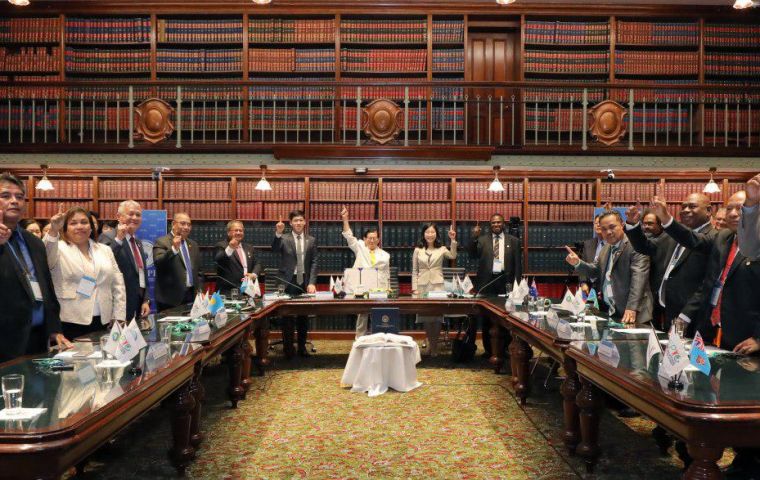MercoPress. South Atlantic News Agency
World Peace devoted NGO connects states and citizens for peaceful development in Asia-Pacific
 Declaration of Peace and Cessation of War (DPCW)’s agenda includes the prohibition of the use of force, development of friendly relations, and peaceful dispute settlement
Declaration of Peace and Cessation of War (DPCW)’s agenda includes the prohibition of the use of force, development of friendly relations, and peaceful dispute settlement As an international NGO associated with the UN ECOSOC, Heavenly Culture, World Peace, Restoration of Light (HWPL) works to connect states and citizens for peaceful development in Asia and the Pacific. Based on South Korea, where the recent scent of peace sprang out, the NGO focuses on 3 unique approaches to peacebuilding.
This includes the establishment of international law for peace to secure peace as a global norm, inter-religious dialogue to overcome ethnic and religious conflicts, and peace education that nurtures human character. In February, the discussion on international cooperation for peacebuilding by collaborative efforts from governments and civil society in Asia and Pacific.
On February 15, a peace festival named “We are One for Peace to Attain Sustainable Development” was held. Hosted by HWPL and Volunteer Individuals for Peace (VIP), the 30,000 participants included governors, local political and ethnic leaders, university presidents and students, and NGO representatives to build an international association for peacebuilding and enhance the role of civil society. HWPL has invested its efforts in interfaith communication and peace education for peace in Southeast Asia. On January 24, 2014, HWPL set up a peace agreement in Mindanao by mediating local leaders and civil society groups to overcome damages of the 50 years of conflict in the region. Since then, peace campaigns such as peace walk by youth, founding peace monuments, exhibitions in the museum and inter-faith dialogues continued to raise awareness of peace to citizens.
Though not affected directly by wars, South Pacific has become the venue for regional cooperation for peace and stability as it faces newly emerging security factors – climate change, economic fluctuation, ethnic diversity, and multicultural coexistence.
On February 19, “2019 Pacific Leaders Summit for Peace : Centre of Spreading Peace beyond Ethnicity and Borders” was held at the New South Wales Parliament House in Australia to discuss the need for an international mechanism for sustainable peace based on the Declaration of Peace and Cessation of War (DPCW). As the main agenda of the summit, the DPCW drafted by international law experts includes principles of peacebuilding such as the prohibition of the use of force, development of friendly relations, and peaceful dispute settlement, which have been advocated by ASEAN and Pacific countries. It further emphasizes cooperation based on interfaith dialogue and civic participation to create and spread a culture of peace. Hon. Gibbs Salika, Chief of Justice of Papua New Guinea, said, “I believe any threat against human security should not be overlooked but to bring awareness and resolve these matters through the implementation of the DPCW in the international field to challenge any threat against human security by cooperation of nations. We must work in solidarity in oneness to create a peaceful atmosphere, spreading the culture and good spirit of peace.” In the summit, former and current heads of state and political leaders in 8 Pacific countries signed “HWPL-Pacific Islands Comprehensive Agreement on Advocacy for the DPCW”. This agreement stipulates that national leaders “actively cooperate and participate in the process of introducing the DPCW to the UN so that it can be adopted and developed into a binding instrument” and “express their support for the DPCW in the form of a document”.
”As humanity continues to evolve, this development is not just to save the world. We must change the world that we live in today. For this, international law is needed to realize peace. The DPCW was drafted by examining 21 international law experts several times. If we all become one and achieve peace, it will be recorded as the work of light forever,” said Chairman Man Hee Lee of HWPL at the 2019 Pacific Leaders Summit.
This flow of network for peace, that has been extended already from Central America, Africa, and Eastern Europe to now the Pacific, led to this peace activities where government officials, leaders of NGOs, and citizens to advocate the UN and global community for international law for peace.




Top Comments
Disclaimer & comment rulesCommenting for this story is now closed.
If you have a Facebook account, become a fan and comment on our Facebook Page!